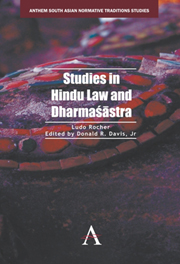Book contents
- Frontmatter
- Contents
- Foreword by Richard W. Lariviere
- Preface
- Abbreviations
- Note on the Edition
- Introduction
- PART ONE THE NATURE OF HINDU LAW
- PART TWO GENERAL TOPICS OF HINDU LAW
- Ancient Hindu Criminal Law
- Hindu Law of Succession: From the Śāstras to Modern Law
- Caste and Occupation in Classical India: The Normative Texts
- Megasthenes on Indian Lawbooks
- The “Ambassador” in Ancient India
- The Status of Minors according to Classical Hindu Law
- Quandoque bonus dormitat Jīmūtavūhanas?
- Notes on Mixed Castes in Classical India
- Inheritance and Srāddha: The Principle of “Spiritual Benefit”
- The Theory of Matrimonial Causes According to the Dharmaśāstra
- Jīmūtavūhana's Dāyabhāga and the Maxim Factum Valet
- The Divinity of Royal Power in Ancient India according to Dharmaśāstra
- A Few Considerations on Monocracy in Ancient India
- PART THREE HINDU LEGAL PROCEDURE
- PART FOUR TECHNICAL STUDIES OF HINDU LAW
- PART FIVE ANGLO-HINDU AND CUSTOMARY LAW
- Bibliography
- Index
Inheritance and Srāddha: The Principle of “Spiritual Benefit”
from PART TWO - GENERAL TOPICS OF HINDU LAW
Published online by Cambridge University Press: 05 February 2013
- Frontmatter
- Contents
- Foreword by Richard W. Lariviere
- Preface
- Abbreviations
- Note on the Edition
- Introduction
- PART ONE THE NATURE OF HINDU LAW
- PART TWO GENERAL TOPICS OF HINDU LAW
- Ancient Hindu Criminal Law
- Hindu Law of Succession: From the Śāstras to Modern Law
- Caste and Occupation in Classical India: The Normative Texts
- Megasthenes on Indian Lawbooks
- The “Ambassador” in Ancient India
- The Status of Minors according to Classical Hindu Law
- Quandoque bonus dormitat Jīmūtavūhanas?
- Notes on Mixed Castes in Classical India
- Inheritance and Srāddha: The Principle of “Spiritual Benefit”
- The Theory of Matrimonial Causes According to the Dharmaśāstra
- Jīmūtavūhana's Dāyabhāga and the Maxim Factum Valet
- The Divinity of Royal Power in Ancient India according to Dharmaśāstra
- A Few Considerations on Monocracy in Ancient India
- PART THREE HINDU LEGAL PROCEDURE
- PART FOUR TECHNICAL STUDIES OF HINDU LAW
- PART FIVE ANGLO-HINDU AND CUSTOMARY LAW
- Bibliography
- Index
Summary
In 1870 the Full Bench of the Calcutta High Court was called on to determine “whether under the Hindu Law current in the Bengal School, the son of a paternal uncle's daughter is entitled to succeed to the estate of a deceased Hindu, if no nearer heirs are forthcoming.” If he was, the property should be his; if not, the property should revert to the Crown.
The answer to this question depended on whether or not Jīmūtavāhana's Dāyabhāga, the highest authority on inheritance in Bengal (see Rocher 1972: 167–176), recognized the paternal uncle's daughter's son as an heir. It was clear that it did not do so explicitly. A further question was then raised, namely whether the order of succession discussed in the Dāyabhāga was meant to be exhaustive, or whether the text merely provided general principles to be applied in the light of specific circumstances. The Court, in a judgment delivered by Mr. Justice D.N. (Dwarkanath) Mitter, decided in favor of the latter alternative: the paternal uncle's daughter's son qualifies as an heir, for he ranks among the sapiṇḍas as defined by Jīmūtavāhana (on the uncertainty of the law prior to 1870, see Mitra 1881: 77–78).
- Type
- Chapter
- Information
- Studies in Hindu Law and Dharmasastra , pp. 267 - 278Publisher: Anthem PressPrint publication year: 2012
- 1
- Cited by



